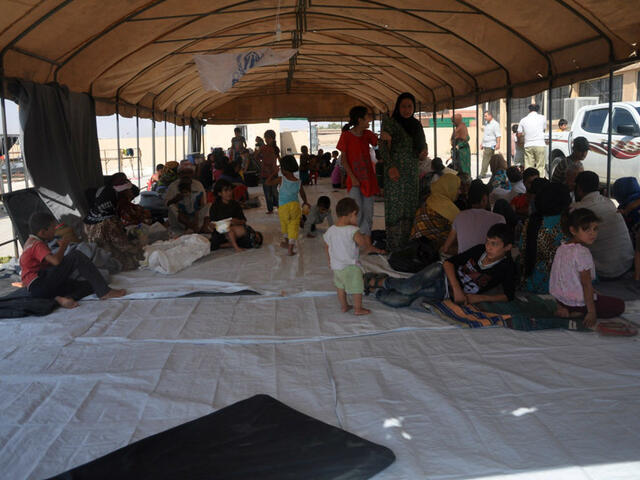New York, NY, August 23, 2016 — Thousands of people have fled the city of Hasakah in northeastern Syria following intense armed clashes, shelling and airstrikes in the past week. Since August 18, some 30,000 have taken shelter in nearby towns and villages, fearing the violence will continue. Most of them are women and children.
The International Rescue Committee responded immediately, providing food and water to some 400 new arrivals, as well as emergency supplies, medical attention and other support for hundreds of people. An IRC-supported medical team also delivered a baby whose mother fled the city.
The vast majority of those who fled Hasakah have been able to stay with family and friends, but more than 100 families have had no option but to sleep in local schools. IRC teams provided these families with supplies including soap, sanitary items, and spare clothing for women, and made sure those with newborns had diapers, baby clothes and cribs.

In addition, IRC social workers provided emotional support for people struggling to cope with the stress of being forced to flee their home, and shared information on other support services available locally.
Some people reported that they became separated from their relatives during their escape or at security checkpoints.
“I found an old man looking for his wife and two daughters – he said he was out praying when a bomb fell on their house,” said an IRC aid worker. “When he came back his neighbor told him that his family had fled. He has been looking for them since yesterday in vain. We took him from shelter to shelter to look for his family – but nothing.”
In some rural areas already damaged by conflict and poverty, IRC aid workers have reported that people arriving from Hasakah are living in cramped conditions, with up to 30 people staying in a single home. Most of the new arrivals require clean water, food and bedding, with women additionally needing spare clothing and sanitary items. The IRC will respond by distributing food, kitchen equipment and hygiene supplies.
Northeastern Syria has mostly managed to avoid the intense fighting experienced across the rest of the country, and since 2014 has been the destination for more than 10,000 people fleeing conflict across the border in Iraq.
In 2015, the IRC helped more than 200,000 displaced Syrians in towns and rural areas in northeastern Syria, as well as providing support in two camps for Iraqi refugees. The IRC also has a team dedicated to the needs of women and girls in the region, providing assistance that includes psychosocial services, specialized support for survivors of violence, and courses that help adolescent girls coping with the crisis build their confidence.